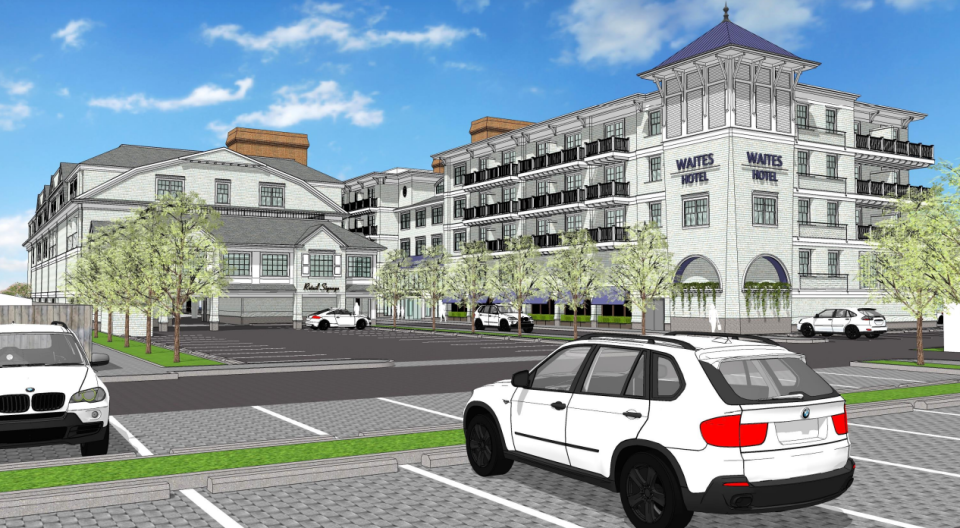What's next for the Waites Wharf hotel proposal? Attorneys make the case.
NEWPORT – As objectors begin presenting their case against the controversial proposal for a hotel on Waites Wharf, the Zoning Board pressed the hotel developers to give a non-monetary justification for the size of the property.
The Abruzese family, working under the business name Harbour Realty LLC, has been trying to get a hotel on Waites Wharf past the city of Newport’s regulatory bodies since the summer of 2019. Since submitting the initial application, the plans for the hotel have been scaled back from 150 rooms to 118 rooms following pushback from abutters and residents who, in general, are opposed to the addition of another hotel on Newport’s waterfront and are more specifically opposed to the size of the proposed hotel in question.
The hotel developer, represented by Attorney J. Russell Jackson, concluded its arguments in favor of its hotel proposal to the Newport Zoning Board of Review on Monday. The developer needs approval from the Zoning Board of Review in order to build on that property and is also seeking relief, also known as a variance, so it does not have to comply with certain aspects of the zoning code, especially when it comes to the size of the hotel itself. The Waterfront Business District, where this property is zoned, only allows for one hotel room per 1,500 square feet, meaning the hotel is only allowed 91 rooms total.

It was on this point that Zoning Board chair Samuel Goldblatt questioned one of Jackson’s expert witnesses, certified city planner Paige Bronk. Bronk’s report testified that the 91-room zoning limit the developer seeks relief from “does not result from the desire of the applicant to realize greater financial gain,” which is one of the standards the Zoning Board uses to decide whether to approve a variance for a project.
However, an expert witness from a prior four-hour meeting in September testified that reducing the 118-room plan to a 90-room plan “significantly impacts the feasibility of the Waites Wharf hotel project,” economically.
“When the application was first made for 150 rooms, that application claimed that that was the minimum relief necessary…and when the application was revised to 128 rooms, that too was represented to be the minimum relief necessary… and now we have a second reduction and a third proposal that is expected to be the minimum relief necessary,” Goldblatt said. “What is it, if anything, besides the economic justification that is the subject of another expert’s testimony, that leads you to believe and opine that the 118 rooms now requested is the minimum relief necessary here?”
Bronk did not have an answer to Goldblatt’s question, only that he relies on the testimony of the former witness. Bronk said he looked at the city’s Comprehensive Plan, the outline of policies and goals for development in the city, holistically.
A later expert witness brought forward by Jackson, Real Estate Appraiser James Houle, argued the city is in need of more hotel rooms, as groups like Discover Newport have pointed out the city is reaching maximum capacity in the summer months, with most hotels regularly selling out of rooms.
“There’s no question for anyone who is investing in the field that there is a constant and increasing need for hotel rooms,” Houle said. “The market is the party who can tell you honestly what is the tipping point (for too many hotel rooms) and I have seen nothing to indicate to say we’ve reached it,” Houle said.
Houle noted that the density standards in the zoning code have not changed since the 1970s and said the City Council should consider updating the code. If the project was proposed in a General Business District, it could have as many as 300 rooms, he said.
The opposition, led by Attorney Scott Spear, who represents the residents of the abutting Coddington Landing Condominium, began presenting its case against the development during the two hours that remained in the meeting, but was only able to get through one of several witnesses. This witness, Coventry City Planner Douglas McLean, argued the property sits on a transitional edge between commercial and residential buildings and, as such, should be careful to maintain the “proper boundary treatments between dissimilar land uses,” which he does not believe the size of the hotel allows.
On cross-examination, Jackson questioned McLean’s characterization of the area south of Waites Wharf as residential, noting there are several short-term rentals registered in the neighborhood and its classification as Waterfront Business District. Still, McLean argued the uses in the area are primarily residential and the hotel is not compatible with the surrounding neighborhood.
The opposition’s arguments will continue at another special Zoning Board meeting on Dec. 11.
This article originally appeared on Newport Daily News: Waites Wharf hotel proposal heard by Newport Zoning Board

